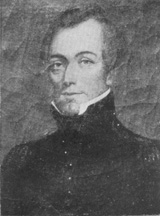Isaac D. Barnard
| Isaac D. Barnard | |
|---|---|
 |
|
|
United States Senator from Pennsylvania |
|
|
In office March 4, 1827 – December 6, 1831 |
|
| Preceded by | William Findlay |
| Succeeded by | George M. Dallas |
| Member of the Pennsylvania Senate | |
|
In office 1820-1826 |
|
| Personal details | |
| Born |
Isaac Dutton Barnard July 18, 1791 Aston Township, Pennsylvania |
| Died | February 28, 1834 (aged 42) West Chester, Pennsylvania |
| Resting place | Oakland's Cemetery near West Chester |
| Nationality | American |
| Profession | Lawyer |
| Committees | Committee on Militia |
| Military service | |
| Allegiance | United States |
| Service/branch |
United States Army Militia |
| Rank | Major-General |
| Unit | Fourteenth Regiment, United States Infantry |
| Battles/wars | War of 1812 |
Isaac Dutton Barnard (July 18, 1791 – February 28, 1834) was an American lawyer and politician who served as a United States Senator from Pennsylvania. He also served as a Pennsylvania State Senator from 1820 until 1826.
He moved to a farm near Chester with his parents, and was a scholar at several public schools. He later resided in Philadelphia until 1811, when he moved back to Chester. While he was studying law, Barnard became a member of the Fourteenth Regiment, United States Infantry, and served in the War of 1812. He fought at the Battle of Plattsburgh, and the Battle of Lyon Creek, and promoted from captain to major for meritorious service. After the war ended he resumed his legal studies, and was admitted to the bar on May 1, 1816. He began practicing law in West Chester. Barnard was the deputy attorney general for Chester County from 1817 to 1821, and an Assistant Burgess in the government of the borough of West Chester in 1821, 1824, and 1825. Barnard was also a major-general of militia, and declined the judgeship of Chester County.
Beginning in 1820, and ending in 1826, he was a member of the Pennsylvania State Senate, and the year he left the State Senate, he was the Secretary of the Commonwealth of Pennsylvania. He was elected to the United States Senate as a Jacksonian, and began his first term on March 4, 1827. During the 21st and 22nd United States Congresses, he was the chairman of the Committee on Militia. In 1829, Barnard was closely defeated in his attempt to gain the nomination for Governor of Pennsylvania. He undertook part of a second Senate term, but resigned from the Senate on December 6, 1831, due to ill health. He was replaced by a future Vice President of the United States, George M. Dallas. Just before he resigned, the New York papers were reportedly demanding that Barnard be given a place in the United States Cabinet. Barnard died on February 28, 1834, in West Chester, and was interred in Oakland's Cemetery nearby.William Everhart, a wealthy merchant, named a street after Barnard, with whom he was a friend, which had been created after Everhart divided up a farm into lots sometime after the summer of 1830.
...
Wikipedia
